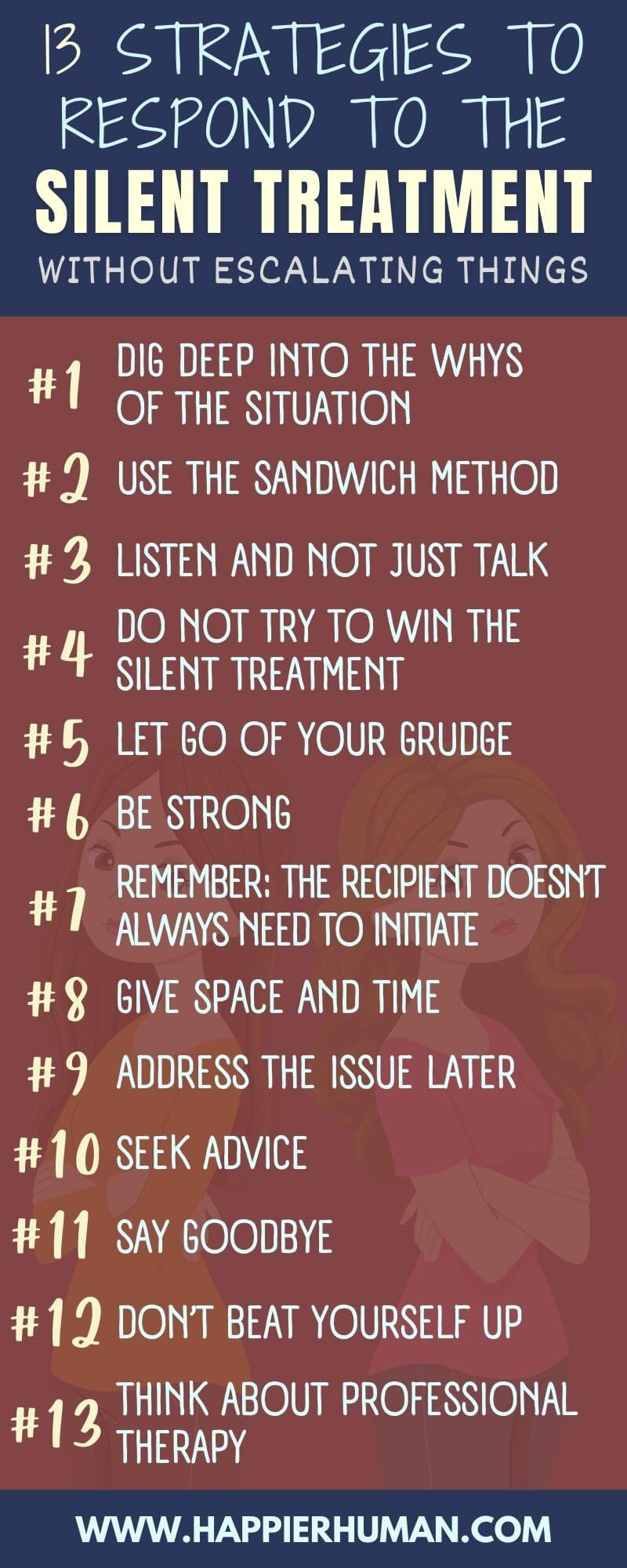Have you ever been in a situation where you wanted your partner to talk to you but they did not? Have you ever ended a conversation with silence?
If so, then you have experienced what’s commonly known as “the silent treatment.”
The silent treatment is a manipulative way to inflict pain on someone without visibly bruising them. It can be damaging if left unaddressed and cause a lot of unhappiness in your relationship.
In this article, you will learn more about what the silent treatment is and get 13 strategies on how to respond to the silent treatment effectively and without turning the conversation into a major argument.
What Is the Silent Treatment?
Silent treatment communicates many feelings, like sorrow, frustration, anger, bitterness, and disappointment, without saying anything. You are often left confused, unhappy, and lonely in such situations.
You might have been given the silent treatment by your boss, colleague, friend, spouse, or parents. It can happen in any type of relationship.
They will deliberately avoid you and give you a cold shoulder. It is a passive-aggressive way to communicate that they are affected by something you said or did.
As mentioned earlier, the silent treatment is a form of manipulation.
Due to its nature, many believe this behavior is not harmful because you are physically safe. What many fail to realize is that mental well-being is as important as our physical well-being. And the silent treatment is meant to disrupt our mental well-being.
To put a definition on the silent treatment, it is a practice whereby you withhold what you want to say to ‘punish' and/or gain control over your subordinate, child, partner, or friend.
Let’s be honest here; all of us have been on both sides of the treatment.
We know exactly how it feels to receive the silent treatment. However, we tend to forget the mental hurt caused by it when we are the ones dishing it out.
Most times, you are not aware as to how you landed in such a situation. For instance, your partner stops talking to you out of the blue and you are apparently supposed to know why they are frustrated.
A common coping mechanism in this situation is to mimic what your partner is doing. As days pass by, you fall out of the situation while leaving the issue unresolved.
Why Do People Use the Silent Treatment?
Silence is a weapon. And it can be an abusive one. Those who use silent treatment repeatedly have some or all of the characteristics listed below:
If there are people in your life who have such characteristics and often give you a cold shoulder, please know that you are not powerless and there are ways to handle them.
How to Counter the Silent Treatment
These simple actions will help you deal with silent treatment in any kind of relationship.
#1. Dig Deep Into the Whys of the Situation
Never assume that you know the reason for the silent treatment you are receiving. It worsens the situation by prolonging it. For example, you cannot simply figure out what is going on in your boyfriend’s mind.
Also, not all people use the silent treatment out of malice. For instance, your mother will never stop talking to you for the express purpose of emotionally harming you or inflicting pain upon you.
It is possible that she has trouble expressing herself. Maybe she does not want you to know something she did against your will and is afraid of your reaction. Yes, you read that right. Mothers can feel scared of their child as well.
However, there are habitual or serial emotional abusers who do it out of malice. They only care about gaining control and power over you.
They want to control you and make you feel that you are below them. The key here is to consciously remind yourself that you are capable of handling such people.
#2. Use the Sandwich Method
Do not imitate what they are doing. Remember that silence can never be a solution to the silent treatment.
Always approach them directly but in a calm and gentle manner. Take a deep breath, clear your mind, and talk in a private place.
Make sure they are comfortable. Initially, they will not talk but you will have to make them speak up. Do not force them. Your attempts at having a conversation with them will eventually break their silence.
Use the sandwich method. It is a technique for giving constructive criticism in which you use “I” statements to convey your feelings and demand an explanation.
Always do the direct approach but in a calm and gentle manner.
However, do not make it all about yourself. Incorporate how it is negatively affecting the both of you. Try to make eye contact as much as possible.

It is okay if what you say triggers anger in them. Your job is to get a response from them and have them speak up. Do not interrupt them and try to keep them calm.
For example, a conversation with your wife may look like this:
“Sweetheart, I love you and I want our relationship to work. I, and I am sure you too, want us to be happy and supportive of each other. Please do not stop talking to me. It only leads to misunderstandings. I am always here to listen if something is bothering you. Is it something I did or say that hurt you?”
#3. Listen and Not Just Talk
Getting the silent treatment might trigger anger in you too and you may lose control over your tone. This will defeat the purpose of your conversation.
So be ready to listen. Note that it is more important than talking when you are trying to coax, for example, your best friend.
Like I said earlier, do not interrupt. They are likely going to clam up if they sense that you are just looking to fight and take the floor. We often fail to realize where we stopped listening.
You might want to learn some empathetic listening skills.
#4. Do Not Try To Win the Silent Treatment
You need to realize that there is no winning or losing when dealing with the silent treatment. It should not be a blame game. Your goal should be to resolve the issue once and for all.
However, both parties should realize their mistakes and make it a point that they do not repeat them.
Acknowledge the other person’s emotions even if you are not the recipient of the silent treatment. Try to validate their experience. It lays the foundation for comfort, openness, and trust signaling towards the fact that you genuinely care about their feelings.
#5. Let Go of Your Grudge
Grudges can be devastating. Irrespective of which end of the silent treatment you are on, always be ready to ask and offer forgiveness.
If you are someone who has never apologized to someone, try it. You will feel so much lighter when your part of the job is done.
However, this is not an easy task. You do not realize but grudges leak out into other aspects of your life. Work on letting it go.
#6. Be Strong
One way to tackle the silent treatment is to act like you are unaffected by it even though it does. Do not let your weak side come out.
It may sound an unhealthy way of dealing with the situation. Please note that some people give the silent treatment to get a particular reaction out of you.
This will not work for every type of situation or person you are in a silent fight with.
For example, if you are an authoritative figure such as a parent, you might want to say, “Whenever you are ready to talk, please know I am always here.”
Keep it short, simple, and calm. Your goal is to only make it clear to your child that you do not allow silence as punishment for you.
#7. Remember: The Recipient Doesn’t Always Need To Initiate
There is no such rule that the conversation can only be started by the recipient. If you the one giving the cold shoulder, you can go up to the one at the receiving end.
Assuming that it is a friend, you can go like “I know I have been quiet and it is not fair to you. I need you to know that I am not in the right headspace right now. All I ask for is some time and space. I will talk once I feel I am ready.”
Effective communication skills always help. Try to make yourself a better communicator every day. Keep an eye on your goal of building healthy relationships.
[Want some great ideas for parenting. Find out what Positive Parenting Solutions is all about, and why it should matter to you, in this detailed review]
#8. Give Space and Time
A silent friend or partner may demand space and time, just like in the instance mentioned above. Try not to think about it and preoccupy yourself with other activities until they are ready to talk.

Make sure that the one who is not responding to you knows that you are expecting an explanation.
#9. Address the Issue Later
Sometimes the issue remains unresolved but things get back to normal. When the time is right, sit with the aggrieved person who is giving you the silent treatment and revisit the situation.
Since some time has passed, the hostility would be somewhat reduced. You can probably clear things out now. You need to do this because the issue is still very much there it is just not out in the open.
You can end such conversations by letting the other person know that you do not appreciate being treated silently and it is detrimental for both of you.
#10. Seek Advice
You might also want to seek advice especially if it is a boss-subordinate relationship. You do not want your work to suffer because your relationship with your boss or colleagues is not good.
Ask someone who has dealt with a fellow employee or boss who is sulking or silent. They might know how to respond to the silent treatment you are getting at your workplace.
Avoid phrases like “Is there something wrong” because the most common response to such questions is “No.” You will want to say something like this, “I have been noticing that you are not talking much at the meetings lately. Please let me know what the problem is. I am always here.”
Always talk to someone close to you, someone willing to help you organize your thoughts.
#11. Say Goodbye
I understand it is easier said than done. But if you are being silently treated repetitively and you have had enough, end your relationship. Do not let it mentally affect you till the point you cannot take it anymore.
Whether it is a romantic relationship or a professional one, start with stating your boundaries. You might want to say, “I cannot continue with this relationship if you keep shutting me out. The silent treatment is too toxic for me. I will have to call things off if it continues.”
Say the above if you feel there is still a chance. But do follow through if they do it again.
Similarly, if you cannot perform under a silent boss anymore, quit. I understand that you cannot make snap decisions when it comes to work but do not keep continuing with the thought that you are now used to it.
We often feel that we have become immune to the silent treatment. The truth is that you can never get used to it. You do not realize but it is affecting you.
#12. Don’t Beat Yourself Up
Take care of yourself. Do not let the silent treatment get to your head. Do not beat yourself up for not reading someone’s mind.
Receiving the silent treatment for a prolonged period can often lead one into depression. Globally, more than 300 million people of all ages suffer from depression.

To keep yourself healthy, eat well, meditate, surround yourself with positive people, and try not to be alone. Check out How to Meditate: A Complete Guide for Beginners for some excellent tips on meditation.
Love yourself first and keep reminding yourself of your worth. You are smart, capable, and powerful. Do not let anyone convince you otherwise. Click here to learn about the 16 ways to forever change your life’s potential.
#13. Think About Professional Therapy
Let me reiterate that the silent treatment is emotional abuse. If you feel it’s taking a toll on you, seek professional help. You might also ask the person giving you the silent treatment to join you. They will most likely refuse. But you go ahead and book an appointment.
The thing with psychologists or counselors is that they keep their personal biases and judgments aside. They keep themselves from talking until you have shared every bit of your story.
This will also keep you from taking any medications that you are taking for stress and anxiety. Consider solutions that are healthy and manageable in the long run.
Final Thoughts on Countering the Silent Treatment
When responding to the silent treatment, there are certain things that you should avoid which include the following:
Remember all the times when your silent boss or anyone else for that matter was nice to you. Do not let just one or two instances ruin your relationship.
These silent treatment tips are neither exhaustive nor magical.
Please bear in mind that all that I talked about in this article is situational. It is not necessary that everything applies to you. You are the best judge of your problem.
Now, if you want additional strategies to improve your relationship, then you might want to create what are called “core values” with your significant other. Here are 11 examples of relationship core values you can make.


